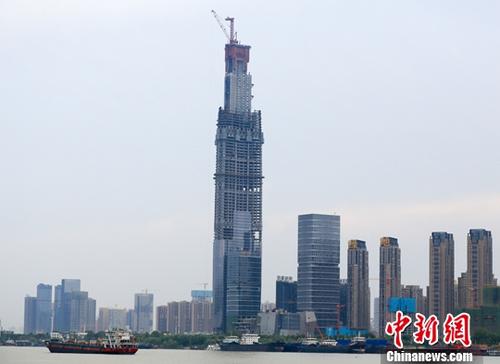(Economic Observation) Many places in China have issued "restriction orders" for house prices. Is the property market turning point?
China News Agency, Beijing, September 9th (Reporter Pang Wuji) In just a few months, the Chinese real estate market seems to have seen a turning point in the hot-cold transition.
One of the important signs is that the "restriction order" that restricts the price drop of new homes has returned to the world.
Recently, many places, including Jiangyin, Jiangsu and Yueyang, Hunan, have issued policies or interviewed related companies on issues such as price cuts by developers.
According to statistics from Centaline Real Estate Research Center, more than six cities have done so recently, including Tangshan, Shenyang, Heze, Kunming, Jiangyin and Yueyang.
Data map: the property market.
Photo by China News Agency reporter Zhang Chang
For example, Jiangyin City proposed that low-price dumping and price wars are strictly prohibited (such as lower than cost prices, price reductions in disguise, etc.), and resolutely put an end to vicious competition, lowering of standards and quality, late delivery and other violations of laws and regulations.
Those with bad circumstances will cancel all batches of pre-sales and switch to existing home sales.
In addition, according to many local media reports, Yueyang, Hunan recently proposed that the sales price of new houses should not be less than 85% of the record price.
Changchun also issued a document previously requiring real estate companies to reasonably declare and publicize the pre-sale price of commercial housing, and the actual sale shall not be less than 10%.
Limiting the decline in new home prices is not the first time.
In 2014, when the property market was in adjustment, Hangzhou City once stipulated that the actual transaction price of commercial housing was lower than the record price by more than 15%, and online signing would be restricted.
In 2017, Zhongshan City, Guangdong Province made it clear that the actual sales price of commercial housing was higher than the record price or dropped by more than 15%, and online signing was not possible.
In 2019, Maanshan City in Anhui Province stipulated that the price of new houses should not be less than 10% of the recorded price.
In the same year, Dalian City also required that the actual online signing and filing price of new projects should not fall by more than 5%.
Naturally, cities with strong housing prices do not need to "limit the decline."
Most of the places where “restriction orders” will be issued, inventory pressure has increased, and the real estate market has undergone a turning point.
Taking Yueyang, Hunan as an example, according to data released by the National Bureau of Statistics, the price of new houses in Yueyang fell by 0.7% month-on-month in July, which was the place where the price of new houses in 70 large and medium-sized cities fell the most. Second-hand house prices in Yueyang also fell by 0.6% month-on-month. Among the 70 cities, the decline was second only to Nanchong.
In addition, Kunming, Yueyang and other cities have also exposed the news that the prices of many new housing projects have dropped significantly since the second half of the year.
Zhang Dawei, chief analyst of Centaline Real Estate, said that this year's property market regulation has increased.
From the new lottery in Hangzhou, to restrictions on divorce purchases in Beijing, to the time when talents settled down in many places to purchase houses, the loopholes in the past are being plugged one by one.
Coupled with the tightening of financial end such as housing loans, it is inevitable that the property market will enter an adjustment cycle in the second half of 2021.
However, this adjustment is not simultaneous or simultaneous.
While some cities are "restricted", other cities with strong demand may still tighten controls to cool the market.
For example: Recently, Haikou and Sanya have successively upgraded the regulation of the property market, requiring commercial residential projects that have been filed to not increase prices within one year in principle.
Zhang Dawei believes that this shows that two-way regulation has taken place in the real estate sector, with the coexistence of controlling the rise and limiting the fall.
Why have many places issued "restriction orders"?
Li Yujia, chief researcher of the Guangdong Provincial Housing Policy Research Center, told a reporter from China News Agency that the "three stability" is the target of the property market regulation for both the central and local governments. Big rises and falls are undesirable and may trigger the market. Expected volatility.
After the expectation of falling house prices is formed, it will cause prices to fall further, thus forming a cycle.
Therefore, the government needs to intervene.
In recent years, when housing prices have fallen, there have often been situations in which homeowners gather to "protect their rights" and protest against developers' price cuts.
At this time, "house troubles" for the price and quality of real estate will also be frequently staged.
If house prices fall too fast, some home buyers may stop repaying their mortgages, or even a "off-supply tide" may occur, triggering financial risks.
It is worth noting that the "restriction orders" are often introduced in weak second-tier or third- and fourth-tier cities.
Li Yujia pointed out that compared with the first- and second-tier key cities, the third- and fourth-tier cities tend to have relatively single, traditional industrial structures and slower upgrades.
The prosperity of real estate and the strong industrial relevance that rely on real estate to drive the growth of upstream and downstream investment, consumption and employment are very important to these cities.
For example: In some places, household consumption is largely brought about by house purchase and decoration.
Therefore, these cities are less tolerant of falling housing prices.
In addition, falling housing prices means a decline in "land finance", which has a greater impact on financial resources where industrial support is not strong enough.
(over)

